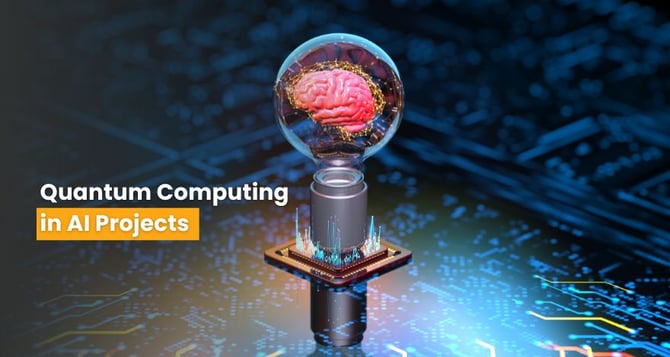Quantum Machine Learning: Potential of Quantum Computing in AI Projects

In the realm of Artificial Intelligence (AI), the fusion of quantum computing and machine learning has given rise to a transformative field known as Quantum Machine Learning (QML).
This article delves into the synergy between quantum computing and AI, exploring the principle applications and providing technical implementations using Node.js.
Understanding Quantum Machine Learning
Quantum computing leverages the principles of quantum mechanics to perform computations in ways that classical computers cannot. In Quantum Machine Learning, these quantum properties are harnessed to enhance the efficiency of machine learning algorithms, promising breakthroughs in solving complex problems.
Quantum machine learning (QML) offers a range of applications across industries.
In logistics, it streamlines routing and inventory management. QML aids materials science, aerospace design, and healthcare imaging. It also revolutionizes climate modeling, telecommunications, manufacturing, and retail, paving the way for a new era of innovation.
Building a Quantum Machine Learning Model with Node.js
Let's explore the technical aspects of creating a simple Quantum Machine Learning model for classification using Node.js. For this example, we'll use the Quantum Development Kit from Microsoft's Quantum Development Kit.
Node.js Implementation in Quantum Machine Learning model
1. Set Up Your Development Environment
Begin by setting up your Node.js development environment and installing the required packages.
2. Create an Express Server for Quantum Machine Learning
Set up an Express.js server to handle requests for quantum machine learning classification.
3. Run Your App
Run your Node.js server using the following command:
Your simple Quantum Machine Learning model for classification should now be accessible at `http://localhost:3000/classify-quantum` or the specified port.
Applications of Quantum Machine Learning in AI Projects
1. Optimization Problems: Quantum computing excels in solving optimization problems, such as finding the optimal parameters for machine learning models.
2. Cryptography: Quantum Machine Learning can enhance cryptographic algorithms, providing more secure solutions for data encryption.
3. Pattern Recognition: Quantum algorithms can accelerate pattern recognition tasks, making them valuable in image and speech recognition applications.
4. Drug Discovery: Quantum Machine Learning is promising in simulating molecular structures, expediting the drug discovery process.
Considerations and Best Practices
1. Quantum Hardware Limitations: Quantum computers are still in the early stages of development, and practical implementations might face hardware limitations.
2. Hybrid Approaches: Combining classical and quantum computing in hybrid models can enhance the scalability and applicability of Quantum Machine Learning.
3. Algorithmic Understanding: Developers need a deep understanding of quantum algorithms to harness the full potential of Quantum Machine Learning.
4. Quantum Error Correction: Implementing error correction techniques is crucial due to the inherent fragility of quantum information
5. Scalability: Quantum Machine Learning models should be designed with scalability in mind to handle larger datasets as quantum hardware advances.
Conclusion
Quantum Machine Learning stands at the intersection of two groundbreaking fields, promising to revolutionize the landscape of AI projects.
Get Future-Ready AI Solutions for Your Business
From concept to deployment, we bring your vision to life through advanced AI development. Reach out to our experts to discuss your project!
As quantum computing continues to advance, developers leveraging technologies like Node.js can explore the synergies between quantum and classical computing for innovative solutions.
While Quantum Machine Learning is still in its early stages, the potential for solving complex problems in AI projects is immense, offering a glimpse into the future of quantum-enhanced machine learning.



.png?width=344&height=101&name=Mask%20group%20(5).png)















